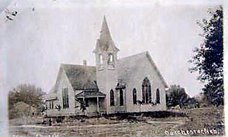Some interesting comments were left on our post regarding the hiring of a new superintendent for Dorchester Public Schools.

An anonymous reader wrote: "It would be great to see our superintendent live in the school district as Galen Johnson and others did. I know housing is a challenge but I think a superintendent living in the district can set the example for other school employees that 'we are all in this together.'"
That drew reaction from another anonymous reader who wrote: "Where exactly are they going to live in our district? Too bad the town doesn't have any (housing) options."
Dorchester's housing problem is not unique. A shortage of quality housing plagues most Nebraska communities that are either growing or sustaining their population. In fact, housing is a problem throughout much of rural America.
Don't take just our word. This week, Mark Hansen, president of West Gate Mortgage in Lincoln, wrote a column published by the Journal Star regarding Nebraska's housing shortage.
Hansen heads a task force to address the housing shortage across the state. He writes: "In many communities, a large portion of the housing stock is pre-1950. ... Proactive community leadership must become involved to solve this issue."
According to Hansen, the supply of houses available for sale is at historical lows due to "a shortage of builders and qualified trades people available in outstate Nebraska to remodel existing or build new." Also, "new construction costs often exceed the market value in outstate markets." (We know this is often the case in Dorchester.)
According to Hansen, there isn’t a one-size-fits-all answer. "Each local community will have to exercise leadership, planning, collaboration, and persistence to achieve success," he writes. "Nothing will happen without local leadership, but great things can happen with committed local leadership."
Hansen points to communities like North Platte, which has created a local grant program to stimulate
new construction, and Scottsbluff, which operates a purchase-rehab-resale program that buys old homes, renovates them
with local correctional labor, then puts the improved properties back on the
market.
He also noted that "more than 20 Nebraska communities are utilizing locally driven and locally approved tax increment financing (TIF) strategies to open new lots for construction. Without TIF, costs to install the modern, necessary, public infrastructure would make the lot construction cost prohibitive."
What can Dorchester do to address our housing challenge? The Times recommends the following steps:
He also noted that "more than 20 Nebraska communities are utilizing locally driven and locally approved tax increment financing (TIF) strategies to open new lots for construction. Without TIF, costs to install the modern, necessary, public infrastructure would make the lot construction cost prohibitive."
What can Dorchester do to address our housing challenge? The Times recommends the following steps:
- Get a housing plan in place. As Hansen wrote, the housing problem calls for local leadership. That means the village board, the school board, and even local volunteer groups need to collaborate and craft a long-term housing plan. Government and volunteer groups can't fix the problem by themselves or fund the efforts, but they can build consensus, establish a blueprint and bring together those with resources.
- Work with experts -- like those at the Southeast Nebraska Development District (SENDD) -- to study best practices, success stories, programs, and ideas implemented by regional towns of our size to encourage new housing development.
- Focus on retaining our older residents and young people. While it's always nice to attract new residents, no one will care about a community as much as those who've already lived there. What does Dorchester need to keep are older residents here after they've reached an age they can no longer take care of their current homes? How do we convince young Dorchester natives they should consider making Dorchester their home, even if they currently live in a nearby community?
- Attract smaller, more affordable housing projects. While it may not make financial sense to build that $500,000 home in our community, Dorchester could easily support new apartments or duplexes, according to an informal poll conducted by Dorchester Times staff. It's unlikely that a single investor would take the risk of such a project, so a collective effort will be needed to bring together investors who want to see Dorchester's housing market grow.
- Address abandoned houses. About 10% of houses in Dorchester are currently unoccupied. Nothing is harder on a small community than vacant homes -- especially run-down, deteriorating vacant homes. In the past, this blog has conducted an online poll in which nearly two-thirds of Times readers wanted the Dorchester Village Board to consider imposing a blight tax on neglected or abandoned properties in town. This concept has been implemented in communities across the country. If a home has been unoccupied for more than 12 months (verified through water and electricity use), and there is no attempt to sell or rent the property, a $100 per month fine would surely get the owner's attention.


















































I've always thought an area north of town, maybe 1/2 a mile to 2 miles would be a nice place to start a small housing development. Easier to get paving in a separate development, sadly.
ReplyDeleteThere is definitely a need for rental housing in Dorchester. We bought a house to renovate and had 5 or 6 people, who already live in the Dorchester area, approach us before we even really got started with the renovations. I also know of a few families that are looking for houses to buy. If Dorchester could get something started on the housing situation, I think it would be an asset to our community.
DeleteThere is definitely a need for rental housing in Dorchester. We bought a house to renovate and had 5 or 6 people, who already live in the Dorchester area, approach us before we even really got started with the renovations. I also know of a few families that are looking for houses to buy. If Dorchester could get something started on the housing situation, I think it would be an asset to our community.
DeleteThere is definitely a need for rental housing in Dorchester. We bought a house to renovate and had 5 or 6 people, who already live in the Dorchester area, approach us before we even really got started with the renovations. I also know of a few families that are looking for houses to buy. If Dorchester could get something started on the housing situation, I think it would be an asset to our community.
DeleteDeanna Bird
Telling an employee where they should live probably isn't the best start to a long lasting career. Food for thought.
ReplyDeleteDon't you think they people advocating the superintendent living in the district is the right thing to do? I do.
DeleteLast time I counted there were only a handful of teachers who actually lived in town, maybe less. So it doesn't really matter where they live, just that they are good at their job.
Delete